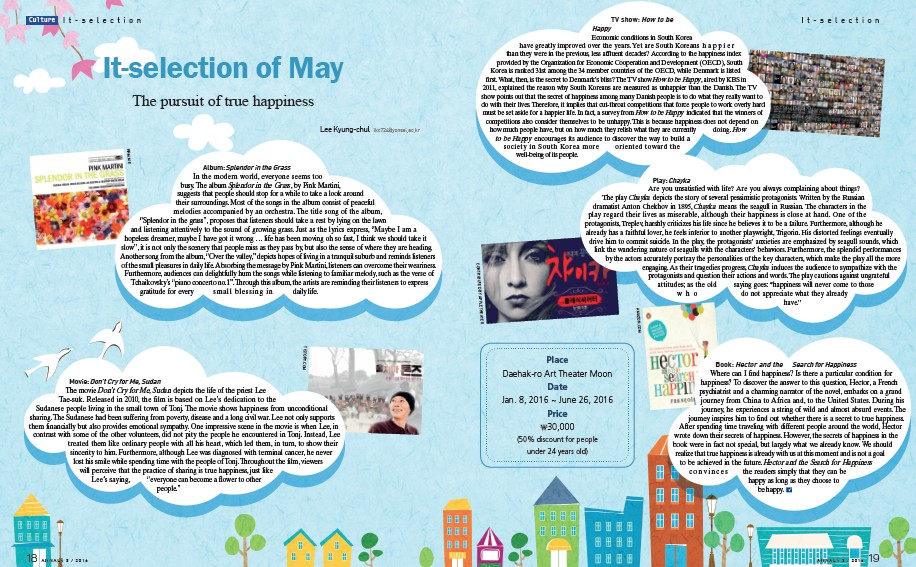The pursuit of true happiness

Album: Splendor in the Grass
In the modern world, everyone seems too busy. The album Splendor in the Grass, by Pink Martini, suggests that people should stop for a while to take a look around their surroundings. Most of the songs in the album consists of peaceful melodies accompanied by an orchestra. The title song of the album, “Splendor in the grass”, proposes that listeners should take a rest by lying on the lawn and listening attentively to the sound of growing grass. Just as the lyrics express, “Maybe I am a hopeless dreamer, maybe I have got it wrong … life has been moving oh so fast, I think we should take it slow”, it is not only the scenery that people miss as they pass by, but also the sense of where they are heading. Another song from the album, “Over the valley,” depicts hopes of living in a tranquil suburb and reminds listeners of the small pleasures in daily life. Absorbing the message by Pink Martini, listeners can overcome their weariness. Furthermore, audiences can delightfully hum the songs while listening to familiar melody, such as the verse of Tchaikovsky’s “piano concerto no.1”. Through this album, the artists are reminding their listeners to express gratitude for every small blessing in daily life.
Movie: Don’t Cry for Me, Sudan
The movie Don’t Cry for Me, Sudan depicts the life of the priest Lee Tae-suk. Released in 2010, the film is based on Lee’s dedication to the Sudanese people living in the small town of Tonj. The movie shows happiness from unconditional sharing. The Sudanese had been suffering from poverty, disease and a long civil war. Lee not only supports them financially but also provides emotional sympathy. One impressive scene in the movie is when Lee, in contrast with some of the other volunteers, did not pity the people he encountered in Tonj. Instead, Lee treated them like ordinary people with all his heart, which led them, in turn, to show their sincerity to him. Furthermore, although Lee was diagnosed with terminal cancer, he never lost his smile while spending timewith the people of Tonj. Throughout the film, viewers will perceive that the practice of sharing is true happiness, just like Lee’s saying, “everyone can become a flower to other people.”
TV show: How to be Happy
Economic conditions in South Korea have greatly improved over the years. However, are South Koreans happier than they were in the previous, less affluent decades? According to the happiness index provided by the Organization for Economic Cooperation and Development (OECD), South Korea is ranked 31stamong the 34 member countries of the OECD, while Denmark is listed as first. What, then, is the secret to Denmark’s bliss? The TV show How to be Happy, aired by KBS in 2011, explained the reason why South Koreans are measuring as unhappier than the Danish. The TV show points out that the secret of happiness among many Danish people is to do what they really want to do with their lives. Therefore, it implies that cut-throat competitions that force people to work overly hard must be set aside for a happier life. In fact, a survey from How to be Happy indicated that the winners of competitions also consider themselves to be unhappy. This is because happiness does not depend on how much people have, but on how much they relish what they are currently doing. How to be Happy encourages its audience to discover the way to build a society in South Korea more oriented toward the well-being of its people.
Book: Hector and the Search for Happiness
Where can I find happiness? Is there a particular condition for happiness? To discover the answer to this question, Hector, a French psychiatrist and a charming narrator of the novel, embarks on a grand journey from China to Africa and, to the United States. During his journey, he experiences a string of wild and almost absurd events. The journey inspires him to find out whether there is a secret to true happiness. After he spent his daily life while traveling with different people around the world, Hector wrote down their secrets of happiness. However, the secrets of happiness in the book were in fact not special, but largely what we already know. In other words, we should realize that true happiness is already with us at this moment and is not a goal to be achieved in the future. Hector and the Search for Happiness convinces the readers simply that they can be happy as long as they choose to be happy.
Play: Chayka
Are you unsatisfied with the life that you always complain about? The play Chayka depicts the story of several pessimistic protagonists. Written by the Russian dramatist Anton Chekhov in 1895, Chayka means the seagull in English.The characters in the play regard their lives as miserable, although their happiness is nearby. One of the protagonists, Treplev harshly criticizes his life as he believes it to be a failure. Furthermore, although he already has a faithful lover, he senses severe inferiority to another playwright, Trigorin. His distorted feelings eventually drive him to commit suicide. In the play, the protagonists’ anxieties are emphasized by seagull sounds, which link the wandering nature of seagulls with the characters’ behaviors. Furthermore, the splendid performances by the actors accurately portray the personalities of the key characters, which makes the play all the more immersing. As their tragedies progress, Chayka induces the audience to sympathize with the protagonists and question their actions and words. The play cautions against ungrateful attitudes; as the old saying goes: “happiness will never come to those who do not appreciate what they already have.”
Place: Daehak-ro Art Theater Moon
Date: Jan. 8, 2016 ~ June 26, 2016
Price: 30,000 (50% discount for people under 24 years old)
Lee Kyung-chul
lkc724@yonsei.ac.kr

